
If you’re researching MBAs, you’ve likely come across the term “executive MBA.” An executive MBA, or “EMBA,” is a unique and specific type of MBA. This advanced degree differs from a traditional MBA in several key features, and is a popular choice among experienced professionals looking to grow their skills and advance their careers. In fact, the Executive MBA Council reports that some 232 universities offer this advanced degree, serving around 26,000 students per year.
So what is an EMBA? Where and how can you earn one? And is an executive MBA right for you? We’ve surveyed the most up-to-date information on EMBAs to deliver a comprehensive overview of today’s executive MBA, its workplace value, the pros and cons of earning one, and how this degree can impact your career and earning potential.
What is an Executive MBA?
An executive MBA, or EMBA, is a type of MBA focused on leadership and executive management. Of course, all MBA programs provide training in leadership and high-level management. So what distinguishes an executive MBA? An EMBA is designed for those who already have professional experience and are looking to advance to higher levels of leadership within their field of expertise. These programs assume you have an understanding of your field, and most EMBAs actually require 5 years’ experience in order to apply, and many programs also require a certain number of years’ experience in a managerial role.
Because they are designed specifically for seasoned professionals, in an Executive MBA program, you’ll hold down your current job while completing accelerated classes on a part-time basis. Classes are accelerated and arranged to accommodate the busy schedule of working execs, with classes held on weekends and evenings, or in day- or week-long blocks. Some programs are even offered in an online or hybrid format, for those who want greater flexibility. Classes will have an applied approach, and focus on developing organizational leadership, business acumen, and industry-specific knowledge.
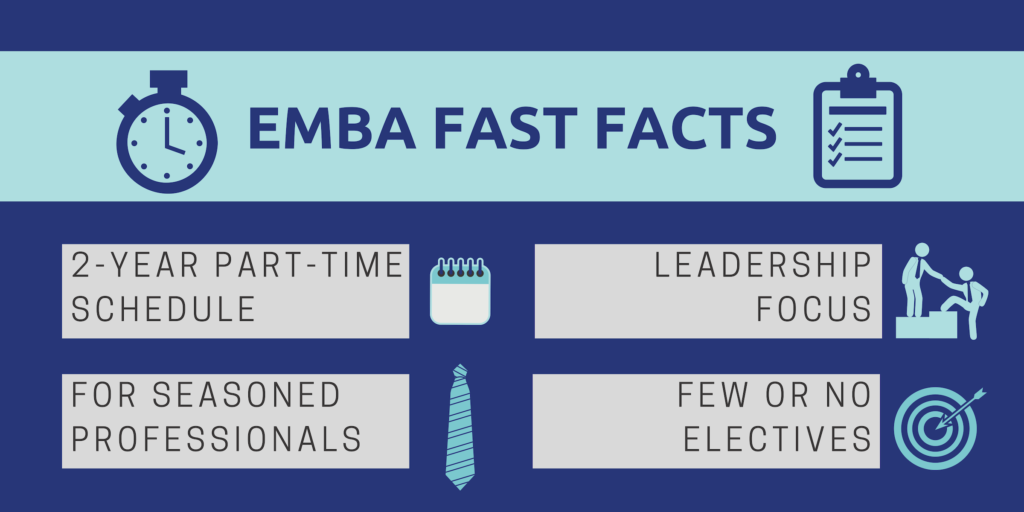
Employers value EMBAs because they train their high-level employees to become better, more effective, and more efficient leaders. The Executive MBA Council’s surveys of large employers consistently find that companies believe that EMBAs allow their executives to make more valuable contributions. That’s why employers tend to be willing to work with students to adjust their schedules to accommodate an EMBA course load, and even to sponsor their tuition. On the student’s side, and EMBA is a sound investment as well, translating into not only more job responsibilities but a higher salary as well.
What is the Difference between an MBA and an Executive MBA?
In many ways, traditional MBAs and EMBAs are the same. Both are designed for students who want to serve as managers within a corporation or other large organization. Both have a rigorous curriculum. Both take around 2 years to earn. And both are valued by employers and associated with high salaries. There are, however, a few key differences between an MBA and an executive MBA.
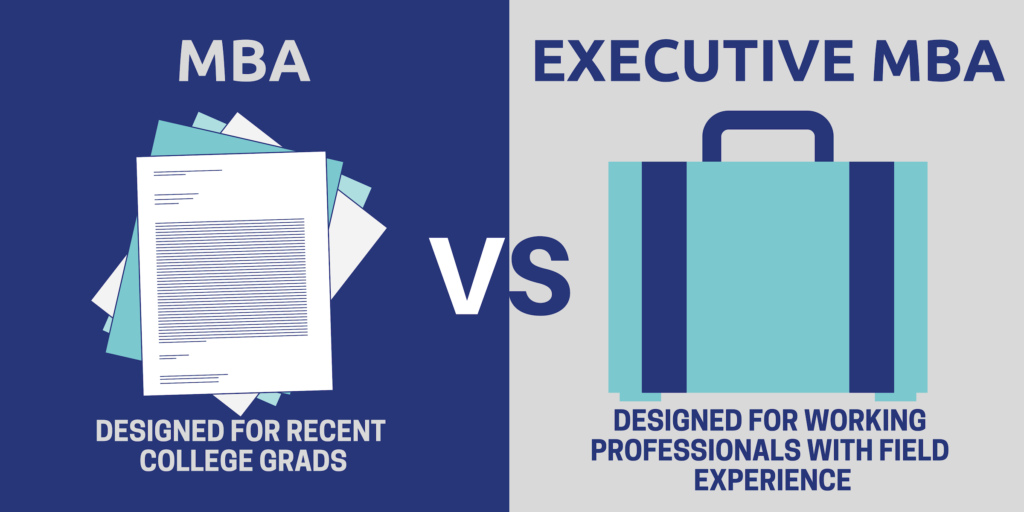
- Student Age and Experience
Many people enroll in MBA programs right out of undergraduate programs. In fact, some schools even offer fast track programs that segway from a BA into an MBA. By contrast, the Executive MBA Council found that the average Executive MBA student is 38 years in age and has14 years’ experience. - Entrance Requirements
Both degrees, of course, require that applicants hold a bachelor’s degree, though not necessarily in a business-related field. In addition, MBA programs require applicants to take the GMAT (Graduate Management Admission Test) and submit their scores as part of the admissions process. Executive MBA programs, on the other hand, typically waive this requirement, though some do request a GMAT score, and a few require scores from the Executive Assessment, a test specific to EMBA programs. - Schedule
A regular MBA usually requires 2 years to complete, and students work on a full-time basis. A part-time MBA program can stretch out to three years or more, with the same classes spread out over a longer period. But executive MBAs are designed for working professionals working in managerial roles that take up a lot of time. So EMBA programs are streamlined, compressing the curriculum for this type of MBA into a two-year, part-time format. - Focus
Executive MBAs are all about teaching students to lead. EMBA programs, therefore, are focused on organizational leadership, applied learning, international connectivity, and personal skill development. - Curriculum
A traditional MBA program includes a number of elective classes, which usually cluster around a concentration, such as Healthcare Management or Supply Chain Management. But an Executive MBA is already fairly specialized, with a strong focus on executive leadership and high-level managerial skills. So an EMBA curriculum will typically include few or no electives.
What Will I Learn in an Executive MBA Program?
The curriculum of an EMBA will always vary by school, but EMBAs generally tend to focus on leadership and professional skill development. Real-world projects are emphasized, and students can draw on their workplace experiences and challenges in the classroom. A typical executive MBA may include classes such as:
- Marketing
- Finance
- Business Policy
- Economics
- Operations Management
- Organizational Leadership
- Quantitative Methods
- International Issues
- Business Ethics
- Business Law
- Entrepreneurship
- Public Policy
- Communication
With today’s international business environment, organizations across the board are emphasizing a global focus. With that in mind, most executive MBA programs also offer some type of international experience option. In fact, the Executive MBA council’s 2018 survey found that a full 93.2% of programs offered an international trip. Some programs also offer global topics as electives or concentrations.

A growing number of executive MBA programs have been created in response to demands from specific industries. These programs are focused on best practices within a discrete sector, such as the medical industry or technology industry. Today, the EMBA Council finds that nearly 10% of executive MBA programs have a specific industry focus.
How Long Does an Executive MBA Take?
If you’re a busy working professional, you can’t put your life on hold while you pursue a degree, not matter how valuable an investment it may be. A traditional MBA takes two years to earn on a full time basis, but you can earn an EMBA in the same time frame on a part-time basis. That’s because the curriculum is streamlined, with fewer classes overall, and a focus on applied learning. In fact, many programs are even shorter, taking as little as 18 months. Others spread out classes more to lighten the course load, and can take closer to three years to complete.
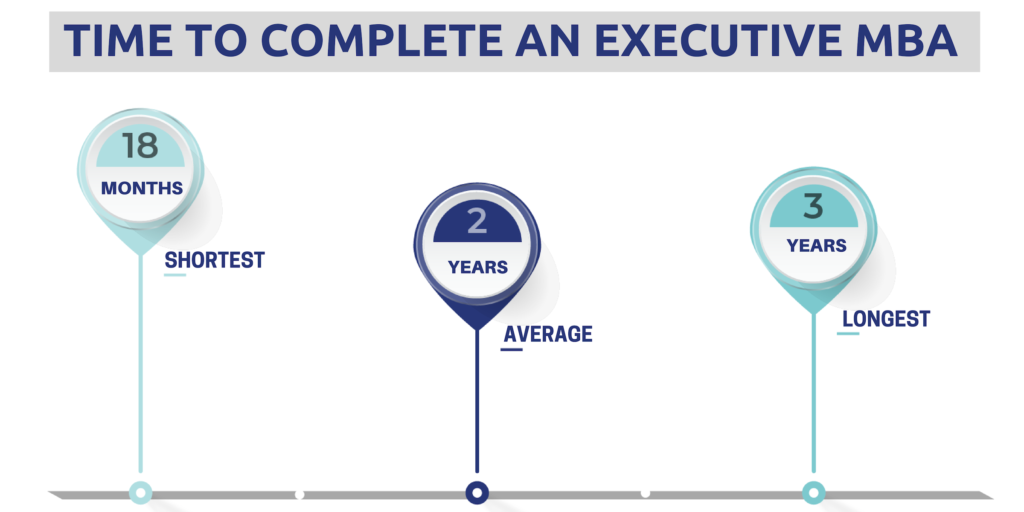
Within that overall time frame, you will have many options as to how to schedule your classes. EMBA programs are available that accommodate a wide range of schedules, including all-day classes held once per week, monthly week-long blocks, or short daily classes. Online classes are the most flexible option, since many deliver course content like recorded lectures on-demand, and build in opportunities for collaboration with scheduled virtual meetings.
Regardless of the format, you can expect to dedicate many long hours to your EMBA degree. The exact number varies by program, of course, but broadly speaking, executive MBA programs comprise 6-10 hours each week in class modules, plus another 10-12 hours’ work for assignments.
Can I Earn an Executive MBA Online?
Executive MBA students want to maintain and advance their careers while pursuing their degree. In addition, with an average age of 38 years, these older students very frequently have family obligations that p[lace demands on their time. All that means executive mea students need to find a way to fit rigorous coursework around an existing work schedule.
Another factor that makes online executive MBAs appealing? The virtual campus. EMBA candidates are mid-career professionals or executives, and tend to have to travel regularly for business, which can make attending regular on-campus classes a logistical challenge. Not only can online classes be accessed any time, but also anywhere, including a laptop or mobile devise while traveling.
Online executive MBAs are not without drawbacks. Many students prefer face-to-face contact with professors and peers, especially when studying interpersonal topics, like leadership and management. And networking with peers, instructors, guest speakers, and alumni can be more difficult in the virtual sphere. This type of connection with influential professionals can be a great resource for job growth, and is an important reason for enrolling an in executive MBA program.
To promote connection and foster networking between students, most online EMBA programs follow a cohort model. In this type of program, a group of students behind their classes at the same time and are expected, progress through the program at the same pace, and graduate together. Progressing through the curriculum in tandem, group members get to know one another well and the graduating class becomes a cohesive unit.
Many online EMBA programs also include some form of on-campus immersion. This face-to-face component might consist of a 1-2 week in-person intensive, or several weekend-long sessions. For those who want more live interaction, many business schools offer hybrid executive MBA programs, with a mix of online classes and regular on-campus classes or meetings. For those with the flexibility to commit to attending these on-campus sessions, a hybrid program can offer the best of both worlds.
How Much Does an Executive MBA Cost?
Needless to say, the price of an EMBA varies greatly. Many students are looking for the most budget-friendly option. Others want to pursue a degree from a top-tier school, regardless of the cost. The average tuition for an executive MBA program is just under $75,000 per year. If the average program takes 2 years to complete, that’s an overall investment of nearly $150,000. A survey by Ivy Exec reports that EMBAs from elite schools such as the Wharton School at the University of Pennsylvania and the Booth School of Business at the University of Chicago can cost nearly twice as much. Textbooks and fees may increase this cost. That’s a considerable investment, even for a mid-career professional, and you may be wondering how you’ll finance your executive MBA.
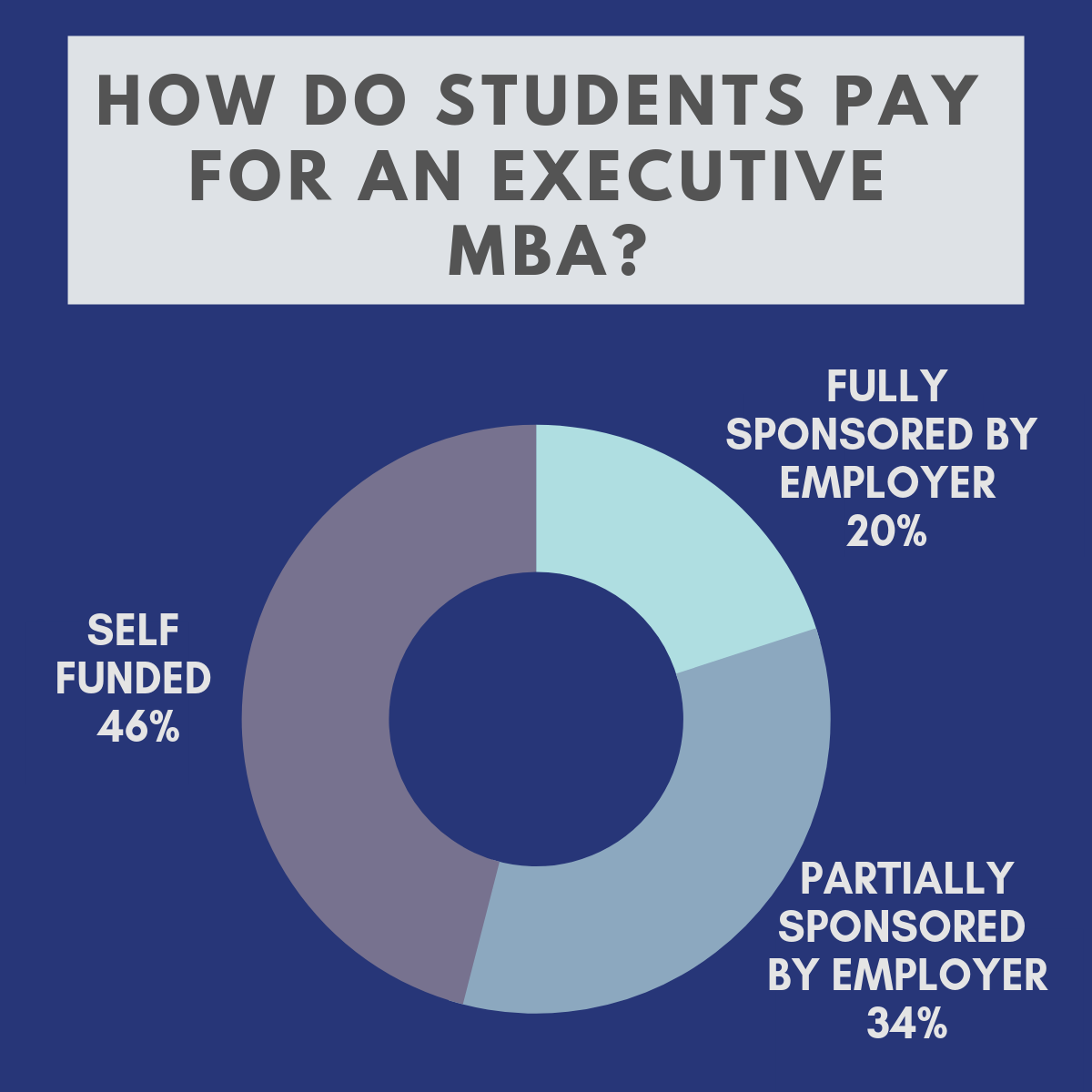
Employers often foot the bill, at least in part. The EMBA Council reports that 20% of executive MBA students have their tuition fully paid for by their employers. Another 34% can count on some portion of their tuition to be sponsored by their employer. The remaining 46% pay their own tuition, but can take advantage of financial aid or tuition assistance. The Executive MBA council finds that almost 59 percent of EMBA programs offer scholarships or fellowships. So before you balk at the price tag, check with your employer to find out if they will sponsor your degree, and at what level. Then research your options for scholarships and fellowships. You’ll then be in a better position to calculate your potential return on investment.
What is the Career Path with an Executive MBA?
As we’ve observed, an executive MBA is explicitly designed for working mid career professionals or executives who are looking to advance in their industry, usually within the same organization. That makes the career path with an executive MBA fairly clear- with this degree, you’ll be moving up the chain from your current role. But what will that look like- and how much can you expect to advance?
The Executive MBA Council’s survey of recent EMBA grads reveals that between the program start and its finish, 54% of executive MBA candidates were given increased job responsibilities and that 39% were awarded promotions. That’s an impressive outcome, especially in the span of 2-3 years. The survey didn’t attempt to measure the career impact of an EMBA beyond the point of graduation, but it seems very likely that the knowledge and skills gained in the course of study would continue to pay off with ongoing career advancement in the years to come.
How Much Can I Earn with an Executive MBA?
Most people think of an MBA as the most lucrative type of master’s degree. But an executive MBA may be an even better investment. As of 2012,
the Washington Post reported that the average salary earned by a professional with a traditional MBA is $90,000, and the average salary associated with an executive MBA is $164,845. That’s a difference of $74,845 per year! Of course, part of this discrepancy is due to the difference in student professional experience. MBA students tend to be much younger and have considerably less professional experience than those working towards an executive MBA.
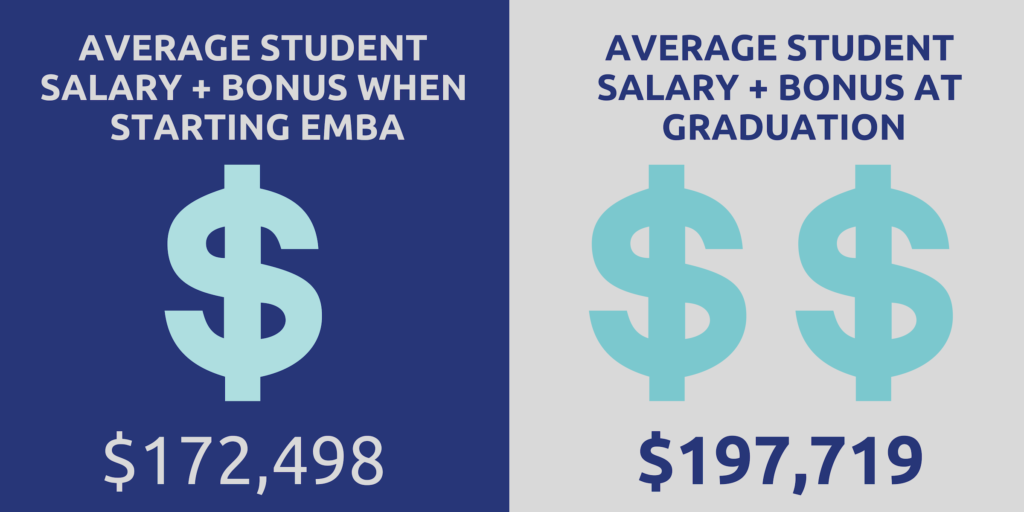
The latest survey by the EMBA council revealed that the average salary and bonus package for EMBA students was $172,498. By the end of their program, their salary and bonus package had risen to an average of $197,719. That’s a 14.6% increase in total compensation- a huge leap to make in just 2 years! This sizable increase in compensation means that, as an EMBA graduate, you’ll soon see a return on your investment. The Huffington Post explains that it now takes an average of 17 months for an executive MBA to pay for itself.
Many employers not pay for tuition and pass out promotions to their executive MBA employees, but also give bonuses for completing this degree. All these facts back up the widespread perception of the EMBA as a sound career investment.
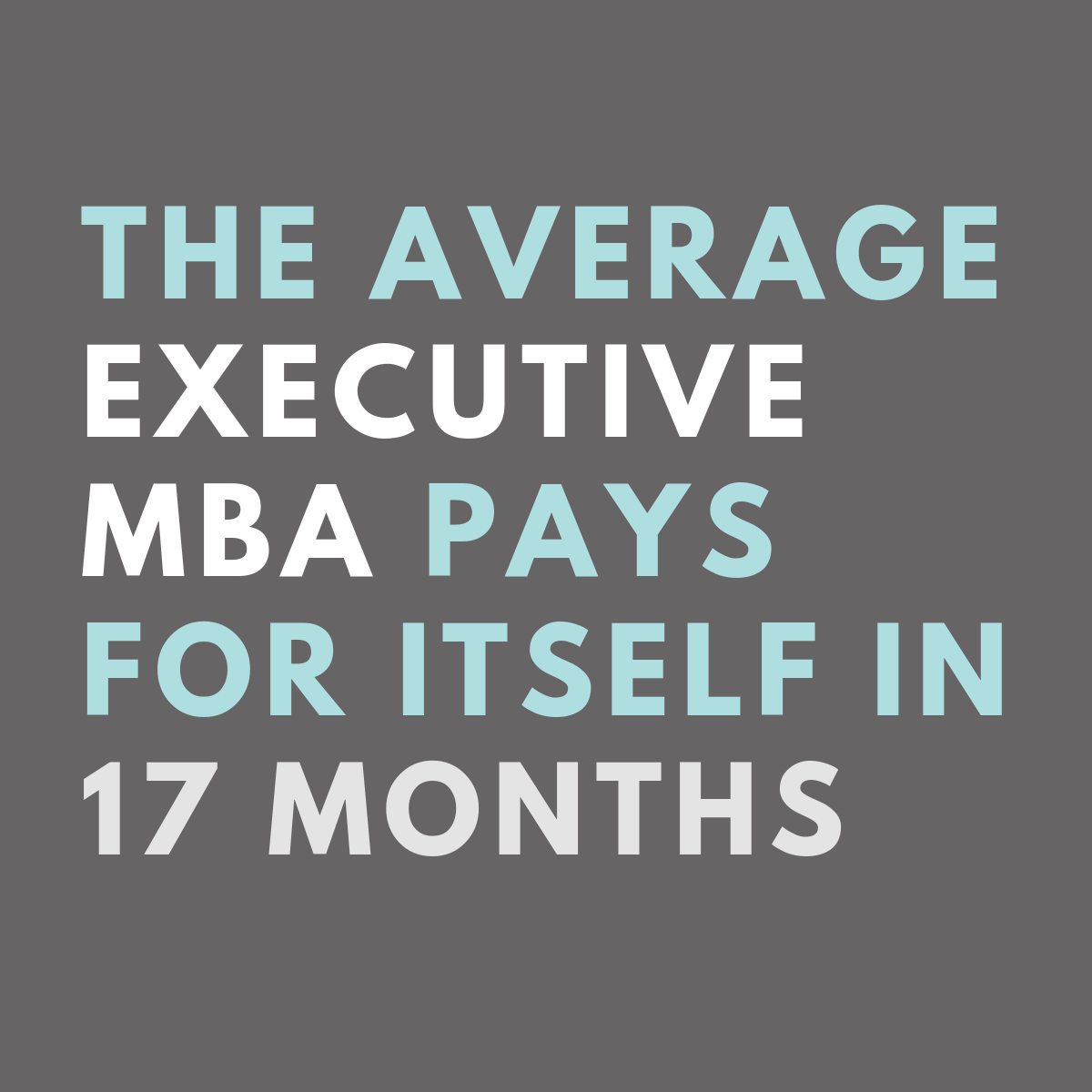
Executive MBA Pros and Cons
Based on our survey of executive MBAs, it’s clear that this advanced degree offers a lot of tangible benefits. With an EMBA, graduates report the following gains:
- An average 14.6% salary increase
- Increasing professional responsibility
- A valuable network of high-level academic peers and contacts
- Promotions within their current workplace
On the other hand, this degree has a number of drawbacks- it’s challenging, demanding, and requires a considerable investment. In order to succeed in an executive MBA program, you’ll need to have a very clear understanding of the challenges ahead, and will want to enlist the support of your employer and family. The main difficulties associated with an executive
- An average tuition of almost $78,000
- 16-22 hours per week to complete class and assignments
- Scheduling classes around existing job duties
- Not all employers will sponsor tuition
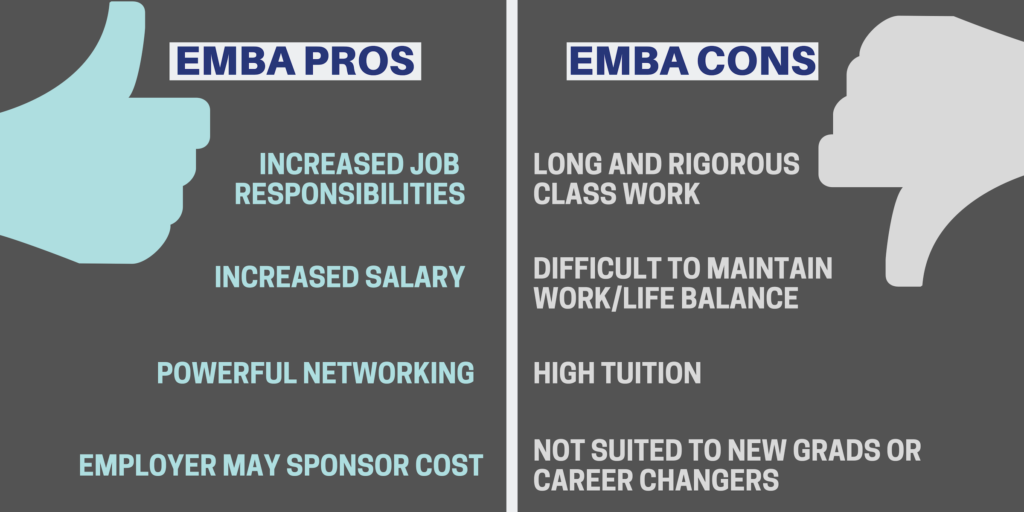
Should I get an Executive MBA?
With the facts above in mind, you may be weighing whether an executive MBA is right for you. This degree is an excellent investment, but it’s not the best fit for every person, or every career.
The main takeaway for an EMBA is that this degree will help you move up the corporate ladder from your current position, to achieve a high level of leadership.
As a recent article inForbes points out, if your goal is to switch careers, you’ll be better served in a full-time MBA program. An executive MBA is also not appropriate if you’re new to your industry, or new to management. Recent college grads who want to get ahead in the business world should either opt for a traditional MBA or spend a few years gaining real-world experience managing projects and people before undertaking an executive MBA.
You’ll also want to ask yourself honestly if you can make the time commitment required to complete your executive MBA. This degree is designed to fit around a full-time schedule, and there are, as we observed above, a huge number of schedule formats offered. But whether you make the time for classes in week-long blocks or nightly sessions, you’ll still have to carve out between 16 and 20 hours per week. If you have outside obligations, such as demanding family commitments, this may not be the right time to start your EMBA.
You’ll also likely need the support of your employer. Even if they can’t fund your tuition or offer a bonus for completing your degree, your employer will still probably need to support your efforts by adjusting your work schedule so you can attend on-campus immersion sessions, complete class projects and so on. Most employers are happy to accommodate these demands because they know that an executive MBA will increase the value of their employee’s work contributions, but you’ll want to be certain that you and your employer see eye-to-eye before applying to an EMBA program.
You may want to consider an executive MBA if you feel your career has hit a plateau. Maybe you’ve been in the same role for some time, and would like to advance to the next level, or you may have earned your bachelors degree some time ago, and feel your skills aren’t as up-to-date as they could be. Many people find that they need fresh technical skills or global studies to break through to the next level in their careers. Many others find that formal training in the “soft skills” or leadership or decision-making can allow them to take on more responsibilities after holding down the same role for some time. Graduates of executive MBA programs also often report that the professional connections they forged with peers, professors, and alumni helped them take their career to the next level.
Finally, you’ll want to be clear on your career goals. An executive MBA is, ultimately, designed to produce top-tier executives. If you want to achieve a position of influence, steer teams to success, and effect organization-wide improvements, an executive MBA can prepare you for this role. The Harvard Business Review has identified seven skills that are essential for c-suite jobs. These include:
- leadership
- strategic thinking
- technical skills
- relationship-building
- communication
- change management
- integrity
- global outlook
If these terms sound familiar, it’s because they are the same skills targeted by EMBA programs. For those who are interested in learning these c-suite skills, and applying them daily in their careers, an executive MBA is a natural fit.